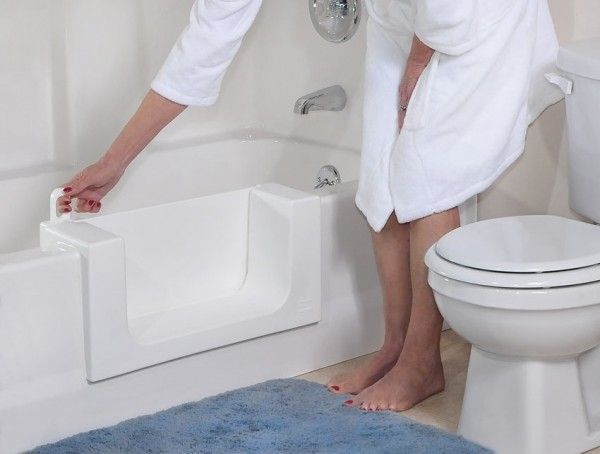Why Do Elderly Refuse to Bathe? Cleanliness is Next to...
Learn how to overcome the challenges and maintain proper hygiene for seniors in assisted living facilities with these dementia strategies for bathing.

By Judy Morton
I don’t know what it is about the elderly and a refusal to take baths. My parents were always extremely fastidious about personal hygiene, even to the end of their lives. And when I had a nearly fatal bout with Type A Hepatitis just before I turned 9, stringent hygiene became even more extremely important to everyone in my family. But I have heard more than one caregiver complain about the difficulties of getting their elderly charges to bathe.
My best friend’s mom once bragged to him that as people get older, they don’t have body odor anymore, so don’t need to bathe as often. He had to tell her the hard truth that yes, they DO have the same amount of body odor; it’s just that their sense of smell was so diminished they could not smell when they stank. My reaction was to be grateful I didn’t have to deal with that issue with my mom. But now I’m facing this with my in-laws.
I’ve long suspected that MIL’s and FIL’s standards of personal cleanliness were not on a level with those of my parents’. Since I began doing their laundry almost a year ago, I’ve had more and more proof this is the case. I know that as people age, their senses diminish, including the sense of smell. I know that Alzheimer’s patients also lose such senses a bit faster than others. But when you practically gag being around them, you do have to wonder how anyone could miss such a pong!
This is really hitting home this week, because there has been a nasty virus going around their ALF, which causes vomiting and diarrhea. MIL succumbed to this virus, and was very ill. But she has refused for the past two weeks to be showered on a regular basis, and now I find that, for the second week in a row, she has also refused to allow her bed sheets to be changed. So she’s been sleeping in those sheets for 3 weeks; sweating (she keeps the thermostat at 80, then sleeps under a wool electric blanket and a heavy afghan), vomiting, and eliminating in them (I’m seeing more and more evidence of bowel and urinary incontinence) – and refuses to allow them to be changed.
Yuck.
Aside from the virus issue, there’s the issue of how frequently she is prone to UTIs, so it really is important that she maintain personal hygiene better than she has been. Unfortunately, she is of sound enough mind to refuse services, and if she says no, they cannot force her to bathe and change. Also unfortunately, since she refuses to have her sheets changed, FIL’s have not been changed, either. I don’t know if he’s refusing because she is, or if the maids just take her refusal as a blanket one for both of them. The only thing we can do is call the management and tell them that the next scheduled change MUST be done, even if she refuses it again.
Because I don’t care what anyone says; this is just plain gross.
Skin care tips for the elderly
FAQ: Why Do the Elderly Refuse to Bathe?
Why do elderly individuals often refuse to bathe?
Elderly individuals may refuse to bathe for various reasons, including discomfort, fear of falling, or simply a lack of energy. In some cases, refusal to bathe can be linked to mental illness, such as depression or dementia, where the person may not recognize the need for personal hygiene or may be too overwhelmed to perform the task.
How does mental illness contribute to the refusal to bathe?
Mental illness can significantly impact an elderly person's daily routines, including bathing. Conditions like depression, anxiety, or dementia can make the task of bathing seem daunting or unnecessary. The refusal to bathe can be a symptom of a broader mental health issue that needs to be addressed by a healthcare professional.
What impact does refusing to bathe have on an elderly person’s mental and physical health?
Refusing to bathe can lead to poor hygiene, which in turn can cause skin infections, odors, and other physical health issues. Additionally, it can exacerbate mental health problems by contributing to feelings of low self-esteem and isolation. Maintaining regular bathing habits is crucial for both mental and physical health.
Could refusal to bathe be a sign that an elderly person is mentally unwell?
Yes, refusal to bathe can be a sign of underlying mental illness. If an elderly person consistently refuses to bathe, it may indicate that they are struggling with a mental health issue, such as depression or dementia. It’s important to consult with a healthcare provider to assess and address any potential mental health concerns.
What should caregivers do if an elderly person refuses to bathe?
Caregivers should approach the situation with empathy and patience. Understanding the underlying reasons for the refusal—whether it’s fear, discomfort, or mental illness—is key. It may be helpful to adjust the bathing routine, offer assistance, or consult a healthcare professional to ensure the elderly person’s mental and physical health is properly managed.
Can refusing to bathe lead to complications that might require emergency surgery?
While refusing to bathe itself is unlikely to directly lead to a need for emergency surgery, poor hygiene can result in infections that could, in severe cases, require medical intervention. Maintaining regular bathing routines is essential to prevent such complications and to support overall health.
How can mental illness be treated to improve an elderly person’s willingness to bathe?
Treating the underlying mental illness through counseling, medication, or other therapeutic interventions can help improve an elderly person’s willingness to bathe. A mental health professional can work with the individual to address their fears or discomfort, thereby encouraging better hygiene practices.
This FAQ provides insights into the reasons behind an elderly person’s refusal to bathe, emphasizing the importance of addressing both mental and physical health concerns to ensure their well-being.
Our Resources section can help you find the information and tools that you need. We have courses, videos, checklists, guidebooks, cheat sheets, how-to guides and more.
You can get started by clicking on the link below. We know that taking care of a loved one is hard work, but with our help you can get the support that you need.
Click here to go to Resources Section now!
You might also like this article:





